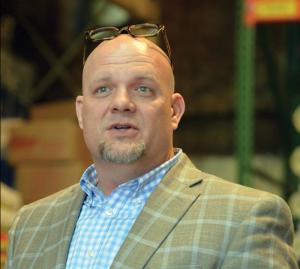Article & photos by Nancy Brannon
Hall’s Feed & Seed in Collierville, TN hosted a Purina Horse Owners Workshop (HOW) on Thursday, April 25, 2019. The evening’s speakers were Matt Karisch, Purina Rep, and Wood Stevens with American National Insurance. HOW guests were treated to supper from Jason’s Deli, and Hall’s co-owner Beverly Thompson gave away several nice prizes.
Karisch spoke on the alternatives to feed your horses when there’s a hay shortage. Did you know that a horse consumes 2%-3% of his body weight per day in dry matter (i.e., hay, roughage)? That’s 20-30 pounds per 1,000 pound horse! So ample hay and/or pasture is essential to their good health. A minimum of 1% is necessary for proper gut health and function.
So, what are some hay replacement options? Chopped alfalfa or other chopped hays, beet pulp, hay pellets or cubes, and complete feeds with hay built in. Karisch gave specific instructions on how to feed each of these, in what quantities, if and how much to soak them, and the proper rations of feeds to use with complete rations. And, he “did the numbers” on the costs.
Karisch touted the benefits of various Purina products, especially complete feeds. Information on each feed included how many kilo calories per pound; percentages of fat and fiber; percentage of protein; vitamins; and any added products, such as soy-blended molasses and beet pulp for “slow burn” calories.
Two important parts of a horse’s diet he emphasized are free-choice access to salt and clean, fresh water at all times.
How do you tell if your horse is being fed properly? One way is through body condition scoring, which he explained.
Wood Stevens spoke on “the most exciting topic everyone wants to talk about!” he said tongue-in-cheek: insurance. His emphasis was farm and equine exposures. American National has policies that can be customized for the horse owner and/or a horse operation.
American National has five divisions of coverage that can be customized.
1. Residence and Household Contents
2. Building and Building Contents (barns, farm structures with stalls, feeders, waterers, silos, sheds, arena footings, etc.)
3. Farm Personal Property (livestock, farm machinery, farm products and supplies, tack and horse equipment, hay)
4. Schedule Personal Property
5. Liability (injury, property damage, equestrian professional liability, business liability, medical payments, etc.)
When you charge for a service, it becomes a business. Personal homeowner policies exclude business activities.
Stevens noted that policies need to be reviewed frequently to make sure that any new purchases, such as tractors, equipment or livestock are listed on the policy.
If you just board your own horse, an incidental farm endorsement might be enough to provide you the liability you need. Teachers and trainers need their own liability. There is also care custody and control on and off premises.
Stevens can customize a program that fits your needs so that you can protect what you value the most.
Hall’s Feed & Seed in Collierville, TN hosted a Purina Horse Owners Workshop (HOW) on Thursday, April 25, 2019. The evening’s speakers were Matt Karisch, Purina Rep, and Wood Stevens with American National Insurance. HOW guests were treated to supper from Jason’s Deli, and Hall’s co-owner Beverly Thompson gave away several nice prizes.
Karisch spoke on the alternatives to feed your horses when there’s a hay shortage. Did you know that a horse consumes 2%-3% of his body weight per day in dry matter (i.e., hay, roughage)? That’s 20-30 pounds per 1,000 pound horse! So ample hay and/or pasture is essential to their good health. A minimum of 1% is necessary for proper gut health and function.
So, what are some hay replacement options? Chopped alfalfa or other chopped hays, beet pulp, hay pellets or cubes, and complete feeds with hay built in. Karisch gave specific instructions on how to feed each of these, in what quantities, if and how much to soak them, and the proper rations of feeds to use with complete rations. And, he “did the numbers” on the costs.
Karisch touted the benefits of various Purina products, especially complete feeds. Information on each feed included how many kilo calories per pound; percentages of fat and fiber; percentage of protein; vitamins; and any added products, such as soy-blended molasses and beet pulp for “slow burn” calories.
Two important parts of a horse’s diet he emphasized are free-choice access to salt and clean, fresh water at all times.
How do you tell if your horse is being fed properly? One way is through body condition scoring, which he explained.
Wood Stevens spoke on “the most exciting topic everyone wants to talk about!” he said tongue-in-cheek: insurance. His emphasis was farm and equine exposures. American National has policies that can be customized for the horse owner and/or a horse operation.
American National has five divisions of coverage that can be customized.
1. Residence and Household Contents
2. Building and Building Contents (barns, farm structures with stalls, feeders, waterers, silos, sheds, arena footings, etc.)
3. Farm Personal Property (livestock, farm machinery, farm products and supplies, tack and horse equipment, hay)
4. Schedule Personal Property
5. Liability (injury, property damage, equestrian professional liability, business liability, medical payments, etc.)
When you charge for a service, it becomes a business. Personal homeowner policies exclude business activities.
Stevens noted that policies need to be reviewed frequently to make sure that any new purchases, such as tractors, equipment or livestock are listed on the policy.
If you just board your own horse, an incidental farm endorsement might be enough to provide you the liability you need. Teachers and trainers need their own liability. There is also care custody and control on and off premises.
Stevens can customize a program that fits your needs so that you can protect what you value the most.









